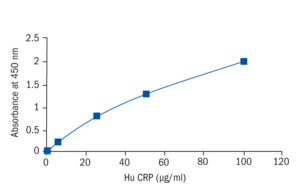CRP Human ELISA
CRP is an acute-phase protein, produced exclusively in the liver. Serum concentration of CRP increases significantly in cases of both infectious and noninfectious inflammation, of tissue damage and necrosis and in the presence of malignant tumours. CRP is present in the active stages of inflammatory disorders like rheumatoid arthritis, ankylosing spondylitis, Reiter’s syndrome, psoriatic arthropathy, systemic lupus erythematosus, polyarteritis, ulcerative colitis and Crohn’s disease. The CRP level increases dramatically following microbial infections, and this can be particularly helpful for the diagnosis and monitoring of bacterial septicemia in neonates and other immunocompromised patients at risk.
Features
- European Union: for in vitro diagnostic use
- Rest of the world: for research use only!
Research topic
Immune Response, Infection and Inflammation, Sepsis
Type
Sandwich ELISA, HRP-labelled antibody
Applications
Serum, Plasma
Sample Requirements
10 µl/well
Storage/Expiration
Store the complete kit at 2–8°C. Under these conditions, the kit is stable until the expiration date (see label on the box).
Calibration Curve

Calibration Range
0–100 μg/ml
Limit of Detection
1 μg/ml
– Yen YT, Yang HR, Lo HC, Hsieh YC, Tsai SC, Hong CW, Hsieh CH. Enhancing autophagy with activated protein C and rapamycin protects against sepsis-induced acute lung injury. Surgery. 2013 May;153 (5):689-98

